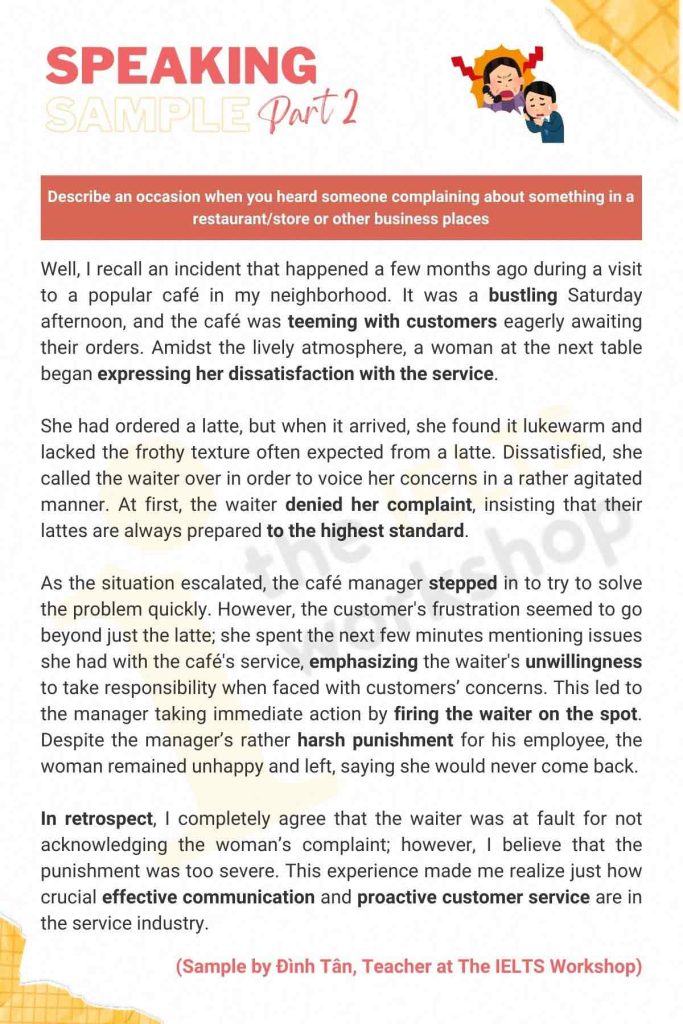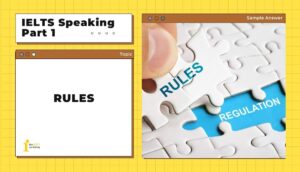Cùng tham khảo bài mẫu chủ đề: “Describe an occasion when you heard someone complaining about something in a restaurant/store or other business places” trong IELTS Speaking Part 2 qua bài mẫu của thầy Đình Tân của The IELTS Workshop nhé.
Part 2: Describe an occasion when you heard someone complaining about something in a restaurant/store or other business places
Describe an occasion when you heard someone complaining about something in a restaurant/store or other business places
You should say:
When and where it happened
What he/she complained about
What the result was
And explain how you felt about the experience
Dưới đây là bài mẫu cho topic “Describe an occasion when you heard someone complaining about something in a restaurant/store or other business places“.
1. Bài mẫu (Sample)

2. Từ vựng (Vocabulary)
- Bustling – Nhộn nhịp
- (to be) Teeming with customers – Đông khách hàng
- Express one’s dissatisfaction with something: bày tỏ sự không hài lòng của một người với một cái gì đó
- Deny one’s complaint: phủ nhận khiếu nại của ái đó
- To the highest standard: theo tiêu chuẩn cao nhất
- Step in: Can thiệp
- Emphasize (v): nhấn mạnh
- Unwillingness: (n) Sự không sẵn lòng
- Firing somebody on the spot: Sa thải ai đó ngay tại chỗ
- Harsh punishment: Hình phạt hà khắc
- In retrospect: Nhìn lại
- Effective communication: Việc giao tiếp hiệu quả
- Proactive customer service: Dịch vụ chăm sóc khách hàng chủ động
Part 3
How do companies train their staff to deal with complaints?
What do people usually complain about?
How do most people complain, in writing or by other methods?
How do people often respond to poor customer service?
How would you react if you received a poor service at a restaurant?
Who are more likely to make complaints, older people or younger people?
1. How do companies train their staff to deal with complaints?
Companies employ various strategies to train their staff to handle complaints effectively. Firstly, they often provide comprehensive training programs that educate employees about the company’s policies and procedures for managing complaints. These programs emphasize the importance of active listening, empathy, and effective communication skills. Additionally, companies may conduct role-playing exercises to simulate real-life complaint scenarios, allowing employees to practice their responses in a controlled environment. Some companies even go as far as creating an entire system to track and analyze complaint data, enabling staff to identify trends and implement proactive solutions.
- Employ a strategy: Áp dụng một chiến lược
- Comprehensive training program: chương trình đào tạo toàn diện
- Role-playing exercise: Bài tập nhập vai
- Simulate (v): mô phỏng
2. What do people usually complain about?
People complain about various aspects of daily life, ranging from transportation delays to noisy neighbors to crowded public spaces, but if I had to guess the one thing people complain about the most, it would be poor service at restaurants or stores. This is because paying customers have certain expectations when it comes to customer service. They expect to be treated courteously, efficiently, and with respect. When these expectations are not met, it can lead to frustration and dissatisfaction towards the service provider, which often subsequently result in complaints in the hope of finding a solution.
- Various aspects of daily life: các khía cạnh khác nhau của cuộc sống hàng ngày
- Paying customer: khách hàng trả tiền
- Courteously (adv): một cách lịch sự
- Dissatisfaction (n): sự không hài lòng
- Frustration (n): sự thất vọng
3. How do most people complain, in writing or by other methods?
In recent years, written complaints have become increasingly common due to the prevalence of online platforms and social media. These platforms allow individuals to easily voice their grievances through emails, online forms, or posts on social media platforms like Twitter, Facebook, and review websites. That being said, other methods like phone calls and face-to-face interactions are still utilized, especially in situations where immediate resolution is desired or when dealing with smaller businesses.
- Prevalence (n): sự phổ biến, sự thịnh hành
- Voice one’s grivence: Lên tiếng phàn nàn
- face-to-face interaction: tương tác trực tiếp
- Resolution (n): cách giải quyết
4. How do people often respond to poor customer service?
When faced with lousy customer service, people often respond in several ways. Firstly, they may choose to bring their complaints directly to the service provider, whether through face-to-face conversations or by filling out a complaint form. Some individuals may also escalate the issue by contacting higher-level management. Additionally, people might share their negative experiences with friends, family, or on social media platforms, amplifying the impact of their frustration. This can have a detrimental effect on the business, especially if poor reviews come from someone of influence.
- Escalate (v): làm leo thang, làm trầm trọng thêm
- Frustration (n): Sự thất vọng
- Poor review: đánh giá không tốt / kém
5. How would you react if you received a poor service at a restaurant?
If I encountered subpar service at a restaurant, I would try my best to handle the situation calmly and assertively. Initially, I’d politely inform the server of the issue, specifying what went wrong. I believe it’s crucial to express dissatisfaction respectfully, avoiding confrontation when raising my concerns. I might request to speak with the manager to discuss potential resolutions or compensation. Nevertheless, I’d remain receptive to any challenges the staff may face. If the problem persists or if the resolution is unsatisfactory, I might consider leaving constructive feedback online or contacting the restaurant later. My goal would be to deal with the issue nicely while staying composed and polite.
- Encounter (v): gặp phải
- Subpar (adj) : dưới trung bình
- Handle the situation: xử lí tình huống
- Calmly and assertively: một cách bình tĩnh và quyết đoán
- Inform someone of something: thông báo cho ai cái gì
- Confrontation (n) Sự đối chất
- Compensation (n) Sự đền bù, sự bồi thường
6. Who are more likely to make complaints, older people or younger people?
Both older and younger individuals may make complaints. On the one hand, senior citizens may be more inclined to make complaints due to their life experience and expectations based on past interactions. Additionally, older individuals may have a greater sense of entitlement to good service, having spent more years as consumers. On the other hand, the younger crowd, particularly millennials and Generation Z, is often more vocal about their experiences, including complaints. They are more likely to share their opinions on social media platforms and online review sites, making their complaints more visible and potentially impactful.
- To be inclined to do something: Có khuynh hướng làm điều gì đó
- The younger crowd: người trẻ
- Impactful (adj): có tác động mạnh mẽ
Bài mẫu bởi thầy Đình Tân – Giáo viên The IELTS Workshop HN
Trên đây là bài mẫu cho topic: Describe an occasion when you heard someone complaining about something in a restaurant/store or other business places. Các bạn có thể tham khảo các bài mẫu IELTS Speaking Part 2 khác của The IELTS Workshop để có thể nâng cao kỹ năng Speaking của mình.
Ngoài ra để biết thêm được nhiều chiến lược làm bài Speaking thú vị khác, đừng bỏ lỡ khoá học Senior của The IELTS Workshop nhé.









